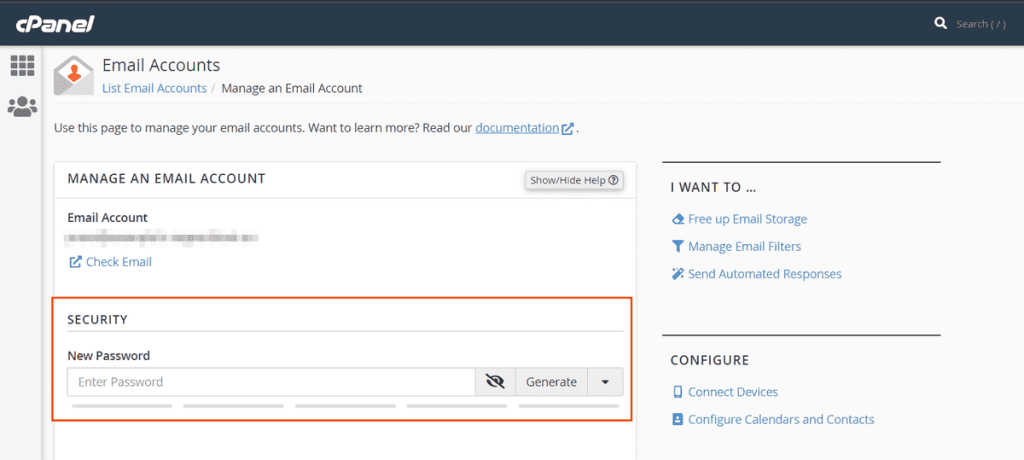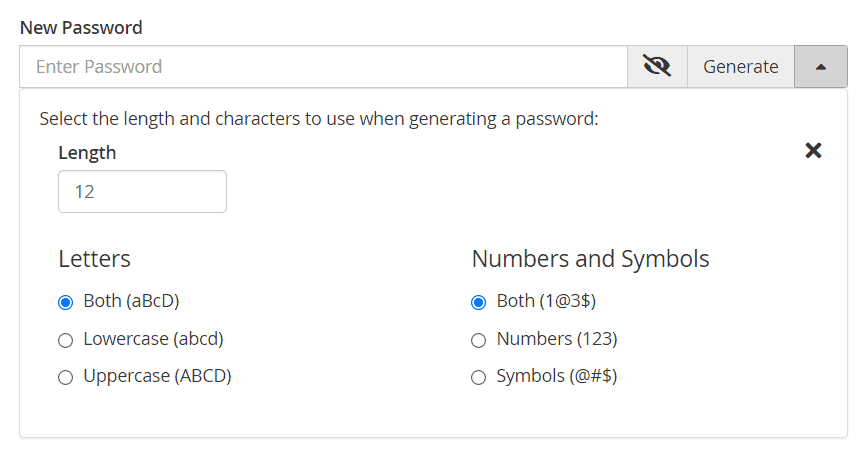Every day, we sign up for many new websites, and it is pretty easy to forget your email account password.
If you lost the login credentials of your email account or are afraid that it may be compromised, you can change email password directly from cPanel.
In this short tutorial, I will explain you, not just how to change your password, but also how to choose it appropriately to improve the security of your email accounts.
Table of Contents
Change email password with cPanel
To change email password, the first thing you need to do is to login to cPanel.
In the main screen of cPanel, you must spot the “Email accounts” item and click on it.

This page will show all your currently active email accounts, if you don’t see any you need to create a new email account.
Remaining on this page, find the email account you want to change and click on the “Manage” button.

In the “Security” section, you can enter a new password under the “New password” field.

You can generate it automatically by clicking on the “Generate” button.

Next to the “Generate” button, there is also a drop-down menu that will allow you to configure additional parameters on the generated password, just click on the small arrow as shown in the figure.

Here you can edit the length of the generated password and the choice of characters used to generate it: you can choose to use a password consisting of letters and numbers, letters and symbols, or include all available characters.

If you choose to set the password manually, remember to pay attention to the following, or it will be impossible to complete the procedure.
- The password entered must have a minimum length of 5 characters.
- The password entered must score at least 65 at the security level.
The password security level is established based on the following items.
The number of characters: the number of characters greatly affects the security level of a password. A combination of only 5 characters is much more likely to be decoded, unlike a password of over 20 characters which can take years to crack.
Alternating uppercase and lowercase letters: it is essential to alternate the characters of the sequence. For example, a password like “supporthost123” will be easier to crack than “SuPPortHosT123“.
Character sets used: A password consisting not only of uppercase and lowercase characters but also of special symbols will be less likely to be cracked.
We always recommend using a combination of alphanumeric characters, including special symbols such as punctuation marks or other symbols.
After you have manually set or automatically generated a password, you will need to click on the “Update Email Settings” button to save the changes made.

Tips on how to choose a secure password
To protect the safety of your email account, we want to give you some tips that will help you in choosing your password.
Setting a strong password to your email accounts will make it difficult for hackers to attack them. Hackers may use brute force to breach access to an email account.
Different combinations of passwords are attempted through special programs until the hacker can find the right one that grants him access to your account.
Remember, never enter your birth date, name, or surname in the password. Also, do not include any data that your acquaintances may know about. For example, if you support a particular football team, don’t use the name of the sports club as a password.
Never use simple and trivial passwords such as “password“, “qwerty” or “12345678“.
Use different passwords
Whenever you create a new password, and every time you change email password, it is important not to use the same passwords that you use on other websites.
Having a single password for all web services is very convenient, as much as it is dangerous. When you enter a password on a website, it is stored in the site database and it can sometimes be visible to the site administrators.
It often happens that websites are targeted by hacker attacks, exposing all the information present in the databases, including the personal data of the users.
Using a single password puts all your personal and financial data at risk. By accessing an email account, it is possible to obtain, not only personal data, but also important documents.
In addition to creating different passwords for all sites, I also recommend you to change your passwords periodically and, when possible, enable two-factor authentication.

